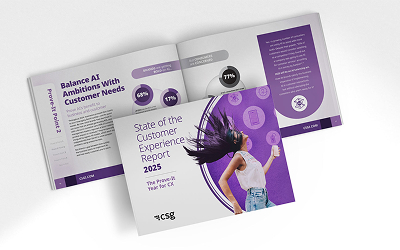Artificial intelligence (AI) is transforming how businesses operate.. In 2024, 78% of respondents said their organizations used AI in their business operations, and most of these respondents have incorporated AI into multiple core processes.
There are multiple types of AI that businesses can use. While generative AI has seen massive success since the launch of models like Gemini and ChatGPT, agentic AI could be even more powerful in the business landscape.
Experts predict that agentic AI will shape industries such as customer service, manufacturing and cybersecurity over the next decade. Orchestration platforms that combine the powers of multiple AI agents aren’t far behind.
What Is Agentic AI?
Agentic AI is an adaptable, autonomous system that uses human-like reasoning to achieve goals. Unlike generative AI, which relies on static datasets, agentic AI gathers and analyzes data from multiple sources in real time. These systems can make decisions independently and execute tasks without human intervention.
Some emerging agentic AI use cases include:
- Predictive maintenance: A system of orchestrated agents and integrated Internet of Things sensors can help industrial facilities and construction companies track equipment health to optimize maintenance schedules.
- Fraud detection: Systems of cybersecurity agents can monitor transactions and flag suspicious behavior to notify security teams for rapid responses.
- Cross-channel marketing: Marketing and analytics agents can analyze customer data to identify and launch the most effective campaigns across each channel your organization uses.
What Are Agents in AI?
AI agents are specialized models designed to autonomously complete their assigned tasks. Each agent is tailored to its role, which is important for several reasons:
- It eliminates unnecessary redundancy.
- It improves efficiency.
- It enables higher-quality work than other AI models.
Although AI agents can function without human oversight, experts believe they’re unlikely to replace humans. A recent study found that the majority of business executives plan to increase spending on human talent rather than automated substitutes.
What Is AI Orchestration, and How Does It Work?
Agentic AI orchestration is a software capability that unites AI agents in their work. Usually, a unified software platform coordinates the agents—whether developed in-house or provided by vendors—to execute connected workflows.AI orchestration works in a layered system:
- Layer 1: Core AI technologies, such as large language models (LLMs), machine learning and natural language processing, break down and understand inputs as they’re received.
- Layer 2: Historical and relational databases support accurate predictions and decisions.
- Layer 3: Contextual data is retrieved from relevant sources.
- Layer 4: Agents collaborate to execute tasks.
- Layer 5: The interface presents a unified result to users.
The orchestration platform integrates all these layers into one system, providing users with a connected workflow experience from start to finish.
How Does Agentic AI Work in an Orchestration Platform?

Orchestration platforms coordinate specialized AI agents to achieve a unified goal. Each agent autonomously performs specific tasks, and the platform synthesizes everything into one cohesive workflow.
Think of an orchestration platform as a team of human employees working under the same supervisor. Each employee plays a specific role within the team, and their supervisor coordinates everyone’s work. This coordination brings the final product together and ensures a high-quality result.
Orchestrated Agentic AI Examples
Some examples of how today’s leading companies use agentic AI include:
Agentic AI in Customer Experience
Coordinated AI agents working together in customer experience (CX) workflows streamline support services for greater efficiency and easier issue resolution.
For example, a CX orchestration platform might include components such as:
- Personalized self-service: An agentic AI chatbot can provide tailored support and recommendations to users in real time by analyzing each user’s account details.
- Proactive issue resolution: CX agents can monitor and analyze network data and user behavior to identify and resolve issues before customers know they exist, reducing frustration and taking a burden off your support desk employees.
- Agent handoffs: Agents can seamlessly hand off chatbot conversations to human employees by sharing chat logs, diagnostics and other user information once it becomes clear that escalation is needed.
Customers can consult with coordinated AI agents so your human support team can provide more personalized recommendations for complex issues.
Agentic AI Security Applications
An orchestration platform for cybersecurity may contain agentic AI applications like:
Continuous network monitoring: AI agents can autonomously run scans and monitor network data to identify threats before conventional cybersecurity software solutions.
Proactive threat resolution: Once the agent has identified a threat, it can autonomously neutralize it and reduce your risk.
Machine learning: ML capabilities ensure agents can learn from new threats and eliminate them faster in the future.
Of course, agentic AI orchestration can benefit cybercriminals as well by giving them faster, easier ways to enter your network. Fighting fire with fire is often the most effective approach to take with advanced cybersecurity, so adopting an orchestration system could potentially help to future-proof your organization.
Streamline AI Adoption With Advanced Solutions From CSG
If you’re exploring what agentic AI orchestration is, how it works, and where it delivers real value, start with our point of view. See agentic AI use cases, agentic AI in customer experience, and how we think about agentic AI security and guardrails—without the hype.
CSG has helped more than 1,000 customer-centric brands use emerging technologies like AI to solve real business challenges. Our teams combine deep experience, innovation and practical solutions that work in the real world, not just in theory.
Ready to learn more about agentic AI and how to apply it with confidence?











